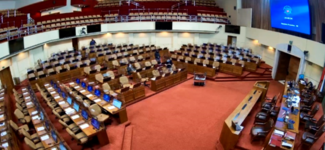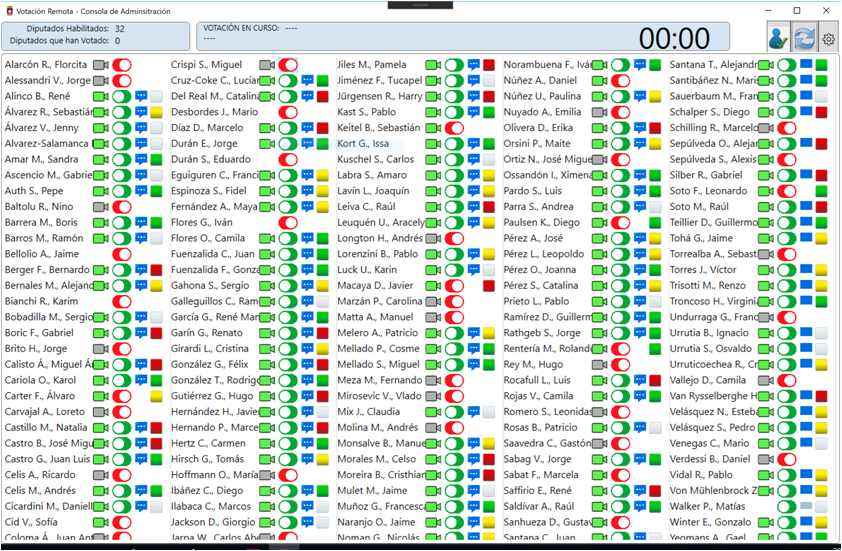- ImpactWe help parliaments to become greener and to implement the Paris agreement.We support democracy by strengthening parliamentsWe work to increase women’s representation in parliament and empower women MPs.We defend the human rights of parliamentarians and help them uphold the rights of all.We help parliaments fight terrorism, cyber warfare and the proliferation of weapons of mass destruction.We encourage youth participation in parliaments and empower young MPs.We support parliaments in implementing the SDGs with a particular focus on health and climate change.
- ParliamentsNearly every country in the world has some form of parliament. Parliamentary systems fall into two categories: bicameral and unicameral. Out of 190 national parliaments in the world, 78 are bicameral (156 chambers) and 112 are unicameral, making a total of 268 chambers of parliament with some 44,000 members of parliament. IPU membership is made up of 180 national parliaments
Find a national parliament
We help strengthen parliaments to make them more representative and effective.. - EventsVirtual eventThe International Court of Justice (ICJ) was constituted under the United Nations Charter to help nations settle disputes peacefully in accordance with international law.
- Knowledge
Discover the IPU's resources
Our library of essential resources for parliamentsGlobal data for and about national parliamentsLatest data and reports about women in parliamentResolutions, declarations and outcomes adopted by IPU MembersRecent innovations in the way parliaments workThe latest climate change legislation from the London School of Economics' database
Chile’s Chamber of Deputies – Congress in the pandemic

Screens were installed in the chamber so that participants attending remotely could be seen and partitions were put up at each desk to maintain social distancing. © Parliament of Chile
The pandemic caused by the COVID-19 virus has had a significant impact on citizens’ lives, with both economic and social effects. As a result, parliament has had to take drastic and urgent measures to meet the new demands of citizens in this complicated time of pandemic. We have seen how different international parliaments have shown a tremendous capacity for response and resilience, with technology playing an important role in maintaining continuity in parliamentary work.
In mid-March, Chile’s Chamber of Deputies, through its information technology department, had to completely rethink its yearly objectives and plans, the main aim being to ensure the continuity of the day-to-day functions of the Chamber by remote means. The primary focus was on the tasks associated with debates, voting and document management.
Given the urgency of the situation, the Chilean Chamber of Deputies had to draw up a very short-term plan, the objective of which was to provide up-to-date technological tools to ensure optimal performance in chamber and committee sessions in this new situation. This plan was set out in four guidelines. The first, covering legal issues, includes provision for legal amendments to allow parliament to meet in a hybrid form, in other words, simultaneously in person and remotely, and which is a key factor in being able to coordinate the other guidelines. The second relates to the provision of an application platform to enable the sessions to be held in a hybrid form, maintaining the primary functions of parliamentary management such as support for chamber and committee sessions, the submission of documents, and support for parliamentary reporters. The third guideline relates to training and organizational culture, including enabling members of parliament to use the new technologies for this new way of working. The last guideline concerns the infrastructure needed to cater for these provisions in order to facilitate the development of the remote functions, including technological aspects covering, for example, network security, minimum bandwidths and the devices that can be used, and others such as monitors and social distancing screens in the chamber.
Legal aspects
The Constitution states that the Chamber of Deputies may only enter into session and adopt agreements if at least one third of its members is present. As the dilemma over whether such presence had to be exclusively in person, or whether it could be through electronic means, had never arisen before, a constitutional amendment was introduced, processed and approved. Through a transitional provision, the Senate and Chamber of Deputies are allowed to hold sessions by electronic means for a period of one year (thirty-second transitional provision), in the event of a health-related quarantine or a constitutional state of emergency due to a public disaster that poses a serious risk to the health or life of the inhabitants of the country or of one or more of its regions, preventing them from meeting, totally or partially, while the constraint remains in place. This rule came into effect on 26 March 2020 and was amended on 30 May 2020 to include Congress as a whole within this entitlement. As can be seen, this authorization is not absolute, but presupposes a situation of public disaster, and is limited to a period of one year and with the requirement that the electronic procedure guarantees that the votes cast by parliamentarians are personal, well-founded and may not be delegated. In any case, as it is a general authorization, it was stipulated that attendance by electronic means in specific sessions requires the agreement of the heads of parliamentary committees (spokespersons) who represent two thirds of the members of the respective chamber. The Chamber has chosen not to amend the Standing Orders, but to issue rules to be applied temporarily, covering both the work of plenary and the committees.
Applications platform
The applications platform primarily entails the development of software that parliament has had to implement in this situation, and which is a key factor in ensuring the resilience of the organization. In the case of the Chamber of Deputies, the development of this entire platform was entrusted to its information technology department.
To commence implementation work, the first step taken was to activate virtual private networks (VPN) so as to provide secure access to the technological resources in operation. One of the first decisions taken was to enable parliamentary reporters to continue their work remotely, making use of the systems in operation to make that possible.
Another factor decided upon was to try out a software tool that would allow debates to take place under the new conditions. In order to have a platform that would allow parliamentary sessions to be held both in person and remotely, Teams, Jitsi and Zoom videoconferencing platforms were tested, with the latter being the platform chosen mainly because of the functions it could offer, the maximum number of participants that could be displayed on screen, its ease of use, and its potential for integration with our applications.
The first mixed chamber session using Zoom was held on 21 April 2020 and, by September 2020, some 54 electronic sessions had been held, with 505 ballots taking place and 41,640 remote votes cast. With regard to committee sessions, 776 hybrid or mixed sessions have been held.
To ensure the smooth running of chamber sessions, an existing application (http://www.camara.cl/sala/) was modified to allow access to all documentation required for a session, and with remote authentication functions, enable requests for the floor and access to the Zoom link for direct log-in to the videoconference. This link, used for each Zoom meeting, is managed by an application, that provides parliamentarians access to the platform with the log-in details for the different Zoom meetings.
With regard to the voting process, parliament developed an internal system which, using mobile devices (both for iPhone and Android), would make remote voting possible. This application has a high degree of security and is integrated into the electronic voting system, so that the results can be reflected together. In other words, remote and in‑person voting results are consolidated on the LED screens located in the meeting room. This system operates in real time; once the President opens a vote, a message is sent to the devices of members of parliament, who, using a security code, can be verified as members and, after receiving information on or the purpose of a vote, can select their voting choice. During the ballot, the President has a console that consolidates the internal voting system, for in-person and remote votes via Zoom, which can determine who has voted and if they meet the established regulatory requirements.

Image: Electronic voting management console available to the President. Image: Parliament of Chile
However, despite the development of the voting applications, unforeseen occurrences can arise during the voting process, for example a drop in bandwidth, problems with the voting application or some other exceptional situation making voting impossible. In such circumstances, the President, providing the parliamentarian in question is present in the Zoom session, can ask the member to state his/her voting choice out loud and then incorporate it into the ballot. In general, around four or five members of parliament vote using this method in each ballot.
A management platform was developed for committee sessions, access to which is made via the internet. Once the member of parliament has been verified, the system shows all committee sessions that are in progress, allowing access to any of the sessions and granting the right to vote only to the official members of the committee. There is no doubt this facility provides an advantage over the in-person systems, as it allows parliamentarians quick access to the different committees in real time and to remain in the committee that is of interest to them.
Another platform that has brought many benefits is the so-called “Virtual Office” (VO), which was created for the purpose of allowing parliamentarians to continue managing their administrative tasks remotely. This platform enables them to deal efficiently with documents such as bills, audit reports and justifications. The documents are sent to the office responsible to be put into the file for the next session or to be forwarded to their recipient for further processing. This application meets the requirements and conditions for the management of each document. For example, a document often requires the minimum support of parliamentarians, therefore the system notifies those invited to support the document beforehand, and once the support submission procedure is completed it is sent electronically for processing. This platform has undoubtedly significantly streamlined the submission of documents by standardizing and centralizing document management and using a system for notifications and support submission on a mobile platform; to date, more than 1,000 processes have been carried out since April.
In addition to the above, and in order to compensate for the restrictions on physical attendance by parliamentarians and officials in the Chamber, a platform has been designed and integrated into different key legislative processes (such as committee reports and minutes) for the signing of documents. The platform interacts automatically with the different processes in which it is integrated and allows those involved to manage their documents efficiently, while ensuring they maintain validity, by incorporating electronic signature technology.
In conclusion, the pandemic has posed a significant challenge for parliament, which is having to use its technological capacities to the full in order to continue operating at the standards possible in the situation. Technology has been an important relevant factor in the process to adapt to a remotely working parliament, which has made it possible to incorporate new tools to improve efficiency in the smooth running of parliamentary work. Finally, in the case of many processes, although established to deal with an extraordinary situation, it is highly likely that they will become permanent in the organization, owing mainly to their ease of access and use, and coupled with the fact that in many cases they reduce management time, the environmental burden and constitute another step towards the so-called digital transformation.




